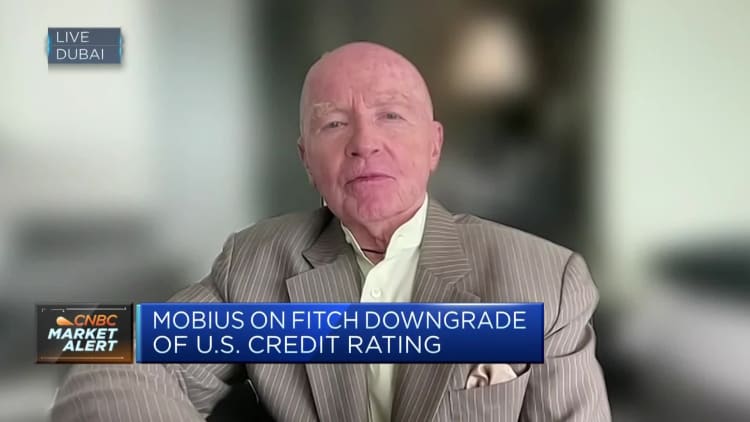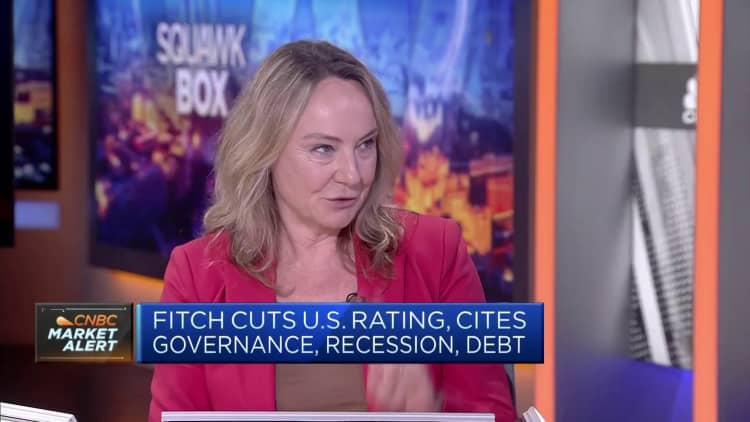U.S. debt downgrade sinks global markets — but economists are not concerned

Traders work on the floor of the New York Stock Exchange, June 29, 2023.
Brendan McDermid | Reuters
Global stock markets tumbled on Wednesday after ratings agency Fitch downgraded the United States’ long-term credit rating — but top economists say there is nothing to worry about.
Fitch announced late on Tuesday that it had cut the U.S. long-term foreign currency issuer default rating to AA+ from AAA, citing “expected fiscal deterioration over the next three years,” an erosion of governance in light of “repeated debt-limit political standoffs” and a generally growing debt burden.
U.S. stock futures were sharply lower after the downgrade, pointing to a fall of almost 300 points for the Dow Jones Industrial Average at the Wednesday open on Wall Street.
The pan-European Stoxx 600 index dropped 1.6% by mid-morning in London, with all sectors and major bourses trading deep into the red, while stocks in Asia-Pacific also plunged across the board overnight.
High-profile economists including former U.S. Treasury Secretary Larry Summers and Allianz Chief Economic Advisor Mohamed El-Erian lambasted the Fitch decision, with Summers calling it “bizarre and inept” and El-Erian “perplexed” by the timing and reasoning. Current Treasury Secretary Janet Yellen described the downgrade as “outdated.”
Goldman Sachs Chief Political Economist Alec Phillips was also quick to point out that the decision did not rely on new fiscal information and is therefore not expected to have a lasting impact on market sentiment beyond immediate shock selling on Wednesday.
Phillips said the downgrade “should have little direct impact on financial markets as it is unlikely there are major holders of Treasury securities who would be forced to sell based on the ratings change.”
“Fitch’s projections are similar to our own — they imply a federal deficit of around 6% of GDP over the next few years — and Fitch cites CBO (collateralized bond obligation) projections in its medium-term outlook, so the downgrade does not reflect new information or a major difference of opinion about the fiscal outlook,” he said in a note Tuesday.
Though this was the first downgrade of its kind since 1994, Fitch’s fellow ratings agency S&P downgraded the U.S. sovereign rating in 2011 and although it had a “meaningfully negative impact” on market sentiment, Phillips noted that there was “no apparent forced selling at that time.” The S&P 500 index recovered 15% over the following 12 months.
“Because Treasury securities are such an important asset class, most investment mandates and regulatory regimes refer to them specifically, rather than AAA-rated government debt,” he said, while also noting that Fitch did not adjust its “country ceiling,” which remained at AAA.
“If Fitch had also lowered the country ceiling, it could have had negative implications for other AAA-rated securities issued by U.S. entities,” Phillips added.
This view was echoed by Wells Fargo Securities Head of Equity Strategy, Chris Harvey, who said the Fitch downgrade “should not have a similar impact to S&P’s 2011 downgrade (SPX 1-day: -6.7%), given the starkly different macro environments and other reasons.
“Wells Fargo believes any pullback in stocks would be “relatively short and shallow.”
Harvey noted that, ahead of the 2011 S&P downgrade, stocks were in correction territory, credit spreads were widening, rates were falling, and the global financial crisis “was still in the market’s collective conscience” — whereas the conditions today are “almost the opposite.”
Other triggers for consolidation
Though the prevailing macro message was one of looking past the Tuesday downgrade, veteran investor Mark Mobius told CNBC on Wednesday that the move may cause investors to rethink their strategies on U.S. debt and currency markets.
“I think from a longer term perspective people are going to begin to think that they’ve got to diversify their holdings, first away from the U.S. and also into equities because that’s a way to protect them from any deterioration of the currency — the U.S. dollar or for that matter any other currency,” Mobius, founding partner of Mobius Capital Partners, told CNBC’s “Squawk Box Europe.”
Though he still anticipates U.S. stock markets will continue rising alongside global peers, he suggested that stateside allocations within investment portfolios may come down slightly and redirect toward international and emerging markets.
Virginie Maisonneuve, global CIO of equity at Allianz Global Investors, meanwhile told CNBC on Wednesday that the market should be looking at other potential triggers for a more prolonged downturn.

“The markets clearly have to pay attention, but we have to remember it’s still investment grade and it’s reflecting the past,” she said of the Fitch call.
“There are other potential triggers for consolidation. We have to remember we’ve had very strong markets, we have the macro peaks — so we have inflation peak, we have growth slowing down, but we still have core inflation.”
She noted that core inflation in Europe has proven stickier than expected, while wheat and grain prices continue to react to developments in Ukraine and could exert further stoke food inflation.
